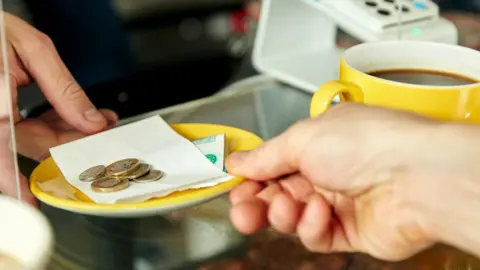 Getty Images
Getty ImagesWorkers should receive all tips from customers under a new law which bans firms from withholding the payments – whether in cash or by card.
More than three million service workers in England, Scotland, and Wales should benefit from the law which comes into force on Tuesday.
If companies break the law and retain tips, staff will be able to bring claims to an employment tribunal.
It applies across industries, but is expected to benefit those working in restaurants, cafes, bars, pubs, hairdressers, or as taxi drivers the most.
Under the new law, all tips must be passed to employees by the end of the following month from when they were received.
Workers will still need to pay tax on their tips, as was the law previously.
‘It gives people a level of protection’
 Tom William
Tom WilliamTom William works in property development, but he used to work for a chain restaurant which took 3% of the value all the food and drink that serving staff sold off their salary – regardless of whether or not customers had tipped.
“I’m delighted about the new law because it gives people on the lowest forms of income and shiftwork a level of protection,” he says.
“There’s such high turnover in these professions. What happened in my experience was that they said: ‘If you don’t hand over your 3%, then we won’t employ you anymore.'”
Bryan Simpson, hospitality organiser for the union Unite, also welcomed the move.
“These are the lowest paid workers in the British economy and they are going to benefit massively from this,” he told the BBC’s Today programme.
Nisha Katona, owner of Mowgli Street Foods, told the BBC the change was needed because “young people depend on the law to protect them” from employers who might avoid sharing tips with staff.
However, while she supported the legislation, she believed it would hit some companies that were unprepared.
“There are going to be some casualties because of this law,” she said.
‘The tips are for their service’
 Andrew Turner/BBC
Andrew Turner/BBCTom Howes and Dory Czicza both work at Fish’o’licious, a fish and chip restaurant and takeaway in Great Yarmouth.
She is a waitress and gets tips, but he does not.
Dory, 28, said: “The tips that we get on card, we take it straight out of the till and put it in the pot as cash.”
Tom added: “I’m the fryer and I don’t get the tips. I get paid a little extra. The tips are for their service – it’s not for the business.”
Emma Webb from The Kitchen in Ilminster, Somerset, said the new rules would not change anything for her business.
“We have jars with everybody’s name on them and at the end of the day all the tips get shared out between all of the staff,” she said.
“If customers give a tip through the card machine I get my staff to print off the receipt so I take the tips out of the till and put them in the jar.”
How will the law work in practice?
Tom Moyes, partner at Blacks Solicitors, says the aim of the law is “transparency and fairness” around how tips are handed out.
Staff can now request a breakdown of how tips are being distributed every three months.
However, Mr Moyes said the question of “fairness” is not clear cut.
“Is there an argument that more senior people should be entitled to a greater level of tip or is the reverse true? There isn’t any guidance on that,” he said.
Meanwhile, the law has not been introduced in Northern Ireland, which Unite said was “completely unacceptable”.
The Northern Ireland executive is currently drafting a workers’ rights bill based on responses to a three-month consultation which closed on Monday.
It told the BBC that “all responses to the consultation”, including proposals to ensure tips are passed onto workers in full, will be taken into account as the bill progresses.
How much should you tip?
Opinions vary on how much customers should tip.
According to VisitLondon, the official tourist guide for the city, a 10-15% tip is customary when eating out in the capital or anywhere else in the UK.
It adds it is also typical to tip taxi drivers around 10% to 15% for black cabs and minicabs in London, but for taxis generally the expectation is that riders round up their payment to the nearest pound and allow the driver to keep that.
Tipping in bars and pubs is not expected.
However, Kate Nicholls, chief executive of trade body UK Hospitality, does not believe there are hard and fast rules on tipping in the UK.
“Rather it is left in the hands of the customer to tip what they feel is acceptable,” she says.
“This is unlike other countries, like the US, where a tip is typically expected to be added by the customer, regardless of service standard.”
